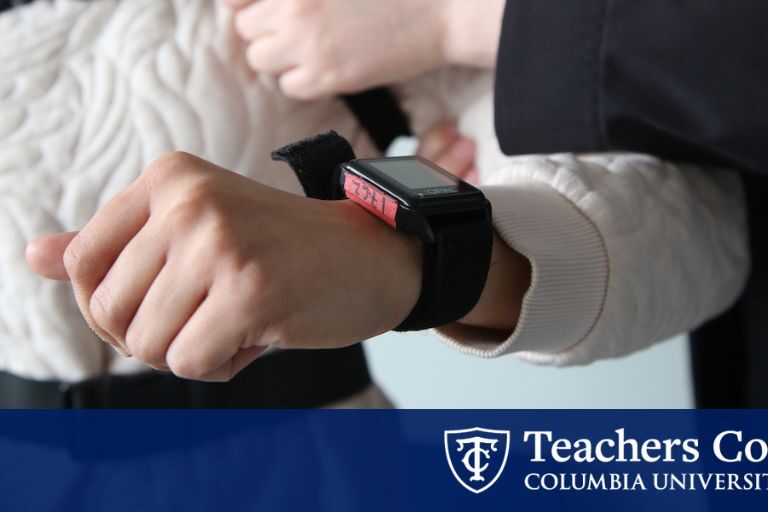More than 6 million individuals worldwide live with Parkinson’s disease, and while incurable, the neurodegenerative disorder can be managed through a variety of treatment and lifestyle adjustments to improve quality of life. That’s where TC’s Lori Quinn, Gemma Moya-Gale and Michelle Troche come in, with the three Biobehavioral Science researchers unveiling respective advancements related to Parkinson’s treatment.
In honor of Parkinson’s Awareness Month this April and the work of Michael J. Fox, one of this year’s highly acclaimed Medal for Distinguished Service recipients, learn more about this work below.
Reducing Barriers to Exercise
In a new guide, “Make Your Move: Exercise for Brain Health and Life with Parkinson’s,” produced and published by The Michael J. Fox Foundation (MJFF), Quinn, TC doctoral student Chelsea Macpherson and their co-authors offer highly-applicable expert insight on how patients with Parkinson’s disease should exercise.
“People get diagnosed and hear that exercise is important, but a neurologist who is meeting with them for an hour does not have the time to go through what that actually means for someone with Parkinson’s,” explains Quinn, whose work at the helm of TC’s Neurorehabilitation Research Lab aims to eliminate treatment barriers through a variety of community health support. “People have really struggled, so it was really important for the guide to be evidence-based. We really tried to take the literature and apply it to this book, and that is something that is unique and different.”
Lori Quinn, Professor of Movement Science and Kinesiology, with students at the Neurorehabilitation Research Laboratory. (Photo: Bruce Gilbert)
Quinn’s relationship with MJFF dates back to 2019, when Quinn began working with the Foundation’s senior vice president of medical communications Rachel Dolhun, MD, DipABLM, and experts on public scholarship and resources — like the upcoming book We Do Research, a follow-up to the illustrated resource that aimed to address care barriers for Black patients with Parkinson’s.
“We need to include patients with Parkinson’s disease from the very beginning, talking about their lived experience and asking them what it is that they need from a book like this,” says Quinn. “This is a very different approach to things, so that has been really great in collaborating with them.”
Accessible Speech Therapy Across Modalities and Needs
Free speech therapy classes funded by the Parkinson’s Foundation and led by Moya-Galé have offered services to more than 60 patients over the span of five years.
“The group has built an incredible sense of community, especially ever since Covid-19,” says Moya-Galé, who views the comradery as just as essential as the speech therapy itself. “Something ordinary [like speaking] becomes a hurdle; it makes many people withdraw within themselves, and causes a lot of social withdrawal, loneliness…We already know the effect that those speech problems have on people’s overall quality of life.”
Teaming up with TC students to provide support, the speech therapy sessions include smaller breakout groups so patients can receive more individualized attention on specific components like voice strengthening, breathing, linguistic skills and more.
Gemma Moya-Gale, Assistant Professor. (Photo: TC Archives)
April is Parkinson’s Awareness Month. Learn more about the disease, symptoms and latest research with The Michael J. Fox Foundation.
In addition to working directly with patients, Moya-Galé and colleagues have been working on an app that helps patients with Parkinson’s practice communicating over ambient noise — a common barrier to everyday life due to the disease’s disruption of volume amplification and muscular control. The app is now undergoing clinical tests, and clinicians like Moya-Galé want to measure whether the program actually drives speech improvement.
However, for the Hispanic/Latinx/é community, Moya-Galé recognizes different needs — emphasizing the research and practice gap for Spanish-speaking patients with Parkinson’s. Her scholarship in this area examines the intricacies of speech therapy needs, and she hopes to continue this work directly with patients in a similar therapy group model.
“The more I learned about the disease, the more I wanted to help somehow,” explains Moya-Galé, whose interest in Parkinson’s disease was influenced by an undergraduate professor living with the condition. “Meeting patients who are advocates…it now has become more personal.”
Testing Life-Saving Treatments for Telehealth
Under the leadership of Troche, Associate Professor of Speech and Language Pathology, an ongoing clinical trial funded by the National Institute of Health compares telehealth and in-person treatment for swallowing and cough disorders in Parkinson’s Disease with the goal of expanding access to these critical treatments.
The trial comes just four years after the initial study, funded by MJFF, demonstrated the efficacy of a novel, sensorimotor approach to improve important clinical outcomes related to cough and swallowing. Disorders of cough and swallowing in Parkinson’s disease can lead to life-threatening aspiration pneumonia, making them of critical need.
Michelle Troche, Associate Professor of Speech and Language Pathology. (Photo courtesy of Troche)
In 2021, Troche and her colleagues at TC and Purdue University reported that it is indeed possible to evaluate and treat swallowing disorders via telehealth, in real-world, pandemic conditions; and created a tutorial for objective speech measures to be completed via telehealth in people with movement disorders and identified the feasibility of key treatments.
“The reality is,” Troche said at the time, “there were a lot of challenges to doing this work during the pandemic, but in many ways, that may make this work more immediately translatable to actual clinical practice. We were able to control fewer factors than you would in the lab, but those are the conditions clinicians encounter.”
Troche’s forthcoming research is set to reveal insights critical to the continued success of telehealth, which 67 percent of speech pathologists report they would like to continue to use for Parkinson’s patients, the scholar also found in a survey.
Learn more about TC’s Biobehavioral Science Department.
— Morgan Gilbard
Published Thursday, Apr 11, 2024

